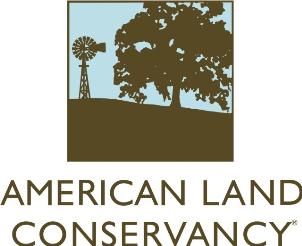
In the United States, a conservation easement is a power invested in a qualified land conservation organization called a "land trust", or a governmental entity to constrain, as to a specified land area, the exercise of rights otherwise held by a landowner so as to achieve certain conservation purposes. It is an interest in real property established by agreement between a landowner and land trust or unit of government. The conservation easement "runs with the land", meaning it is applicable to both present and future owners of the land. The grant of conservation easement, as with any real property interest, is part of the chain of title for the property and is normally recorded in local land records.
Land trusts are nonprofit organizations which own and manage land, and sometimes waters. There are three common types of land trust, distinguished from one another by the ways in which they are legally structured and by the purposes for which they are organized and operated:

The Trustees of Reservations is a non-profit land conservation and historic preservation organization dedicated to preserving natural and historical places in the Commonwealth of Massachusetts. It is the oldest land conservation nonprofit organization of its kind in the world and has 140,000 dues-paying members as of 2018. In addition to land stewardship, the organization is also active in conservation partnerships, community supported agriculture (CSA), environmental and conservation education, community preservation and development, and green building. The Trustees of Reservations own title to 120 properties on 27,000 acres (11,000 ha) in Massachusetts, all of which are open to the public; it maintains conservation restrictions on over 200 additional properties. Properties include historic mansions, estates, and gardens; woodland preserves; waterfalls; mountain peaks; wetlands and riverways; coastal bluffs, beaches, and barrier islands; farmland and CSA projects; and archaeological sites.
The Forest Legacy Program was established in the 1990 United States farm bill to protect environmentally important forest lands that are threatened by conversion to nonforest uses. It provides federal funding for conservation easements and fee simple purchases.

The Michigan Department of Natural Resources (DNR) is the agency of the state of Michigan charged with maintaining natural resources such as state parks, state forests, and recreation areas. It is governed by a director appointed by the Governor and accepted by the Natural Resources Commission. Currently the Director is Daniel Eichinger. The DNR has about 1,400 permanent employees, and over 1,600 seasonal employees.

The American Land Conservancy was an American non-profit organization who's goal was to protect the natural environment.
Private landowner assistance program (PLAP) is a class of government assistance program available throughout the U.S. for landowners interested in maintaining, developing, improving and protecting wildlife on their property. Each state provides various programs that assist landowners in agriculture, forestry and conserving wildlife habitat. This helps landowners in the practice of good land stewardship and provides multiple benefits to the environment. Some states offer technical assistance which includes:

Utah Open Lands Conservation Association is a 501(c)(3) nonprofit land trust conservation association in the United States.
The Georgia Land Conservation Program (GLCP) works to permanently protect land and water resources in the U.S. state of Georgia through public/private partnerships. Created in 2005 by former Governor Sonny Perdue through the Georgia Land Conservation Act, the GLCP provides grants, low-interest loans, and tax credits to achieve permanent land conservation through conservation easements and fee simple ownership.
Conserving Carolina is a non-profit conservation organization working to preserve water and land resources in Western North Carolina. Conserving Carolina was created in July 2017, from a merger of two previously separate organizations, Carolina Mountain Land Conservancy and Pacolet Area Conservancy. The combined organization maintains a primary office in Hendersonville, NC and a regional office in Columbus, NC.
The Grand Traverse Regional Land Conservancy (GTRLC) is a 501(c)(3) non-profit organization based in Traverse City, Michigan. It is an independent organization with its own by-laws, policies, board, staff, and budget. The organization is funded by private donors as well as local, state, and national foundations. The Grand Traverse Regional Land Conservancy has a volunteer Board of Directors and a professional year-round, full-time professional staff.
California Rangeland Trust is a conservation nonprofit organization founded in 1998. The Rangeland Trust is the largest land trust in California, having conserved over 371,000 acres (1,500 km2) of rangeland on 90 ranches across 26 counties.
The Conservation Fund is a U.S. nonprofit organization with a dual charter to pursue environmental preservation and economic development. From 2008–2018, it has placed more than 500,000 acres under conservation management through a program whose goal is to purchase and permanently protect working forests. Since its founding in 1985, the organization has protected land and water in all 50 states, including parks, historic battlefields, and wild areas. The Fund works with community and government leaders, businesses, landowners, conservation nonprofits and other partners to integrate economic and environmental objectives.
Joshua's Tract Conservation and Historic Trust, or Joshua's Trust, is a non-profit 501(c)(3) land trust operating in northeast Connecticut. Joshua's Trust was incorporated in 1966 to help conserve property of significant natural or historic interest. As of 2011, the Trust protects more than 5,000 acres, maintains 42 miles of trails that are open to the public, holds educational outreach programs, and publishes the Joshua's Tract Walkbook.
River Fields, incorporated in 1959 as a not-for-profit land trust in Louisville, Kentucky, has become the largest and oldest river conservancy advocacy group along the Ohio River to effectively protect, preserve and enhance the river front's natural and cultural resources. River Fields is the ninth oldest conservation organization in the United States. River Fields currently owns land or holds conservation easements on 33 properties, totaling more than 2,200 acres. River Fields is one of the nation's few land trusts tackling regional advocacy work as well as land conservation.
North Carolina Land and Water Fund (NCLWF) was created by the North Carolina General Assembly in 1996 as the 'Clean Water Management Trust Fund'. The fund is an independent non-regulatory agency housed in the Division of Land and Water Stewardship in the North Carolina Department of Natural and Cultural Resources. The special revenue fund was created "to clean up pollution in the State's surface waters and to protect and conserve those waters that are not yet polluted. The intent of the fund is "to focus on the cleanup and prevention of pollution of the State's surface waters, the establishment of a network of riparian buffers and greenways, and the preservation of property for establishing clean water supplies, the General Assembly believes that the results of these efforts will also be beneficial to wildlife and marine fisheries habitats." NCLWF issues grants to a variety of entities including local governments, state agencies and nonprofit corporations "whose primary purpose is the conservation, preservation, and restoration of our State's environmental and natural resources".
Scenic Hudson is a non-profit environmental organization in New York that protects land, creates, and enhances parks, and advocates for environmentally responsible policies and development practices.
The Land Trust for Tennessee is an non-profit conservation organization working to protect Tennessee's natural, scenic, and historic landscapes and sites. Since 1999, The Land Trust has conserved more than 135,000 acres (550 km2) of land across 65-plus Tennessee counties.

The Big Sur Land Trust is a private 501(c)(3) non-profit located in Monterey, California, that has played an instrumental role in preserving land in California's Big Sur and Central Coast regions. The trust was the first to conceive of and use the "conservation buyer" method in 1989 by partnering with government and developers to offer tax benefits as an inducement to sell land at below-market rates. Since 1978, with the support of donors, funders and partners, it has conserved over 40,000 acres through conservation easements, acquisition and transfer of land to state, county and city agencies. It has placed conservation easements on 7,000 acres and has retained ownership of over 4,000 acres.
TennGreen Land Conservancy, formerly the Tennessee Parks and Greenways Foundation, is a non-profit land trust, established in 1998 to protect natural and scenic land in Tennessee. It is accredited by the Land Trust Alliance's Land Trust Accreditation Commission. The foundation is supported by membership donations, individual philanthropy, and gifts of land from private landowners.






